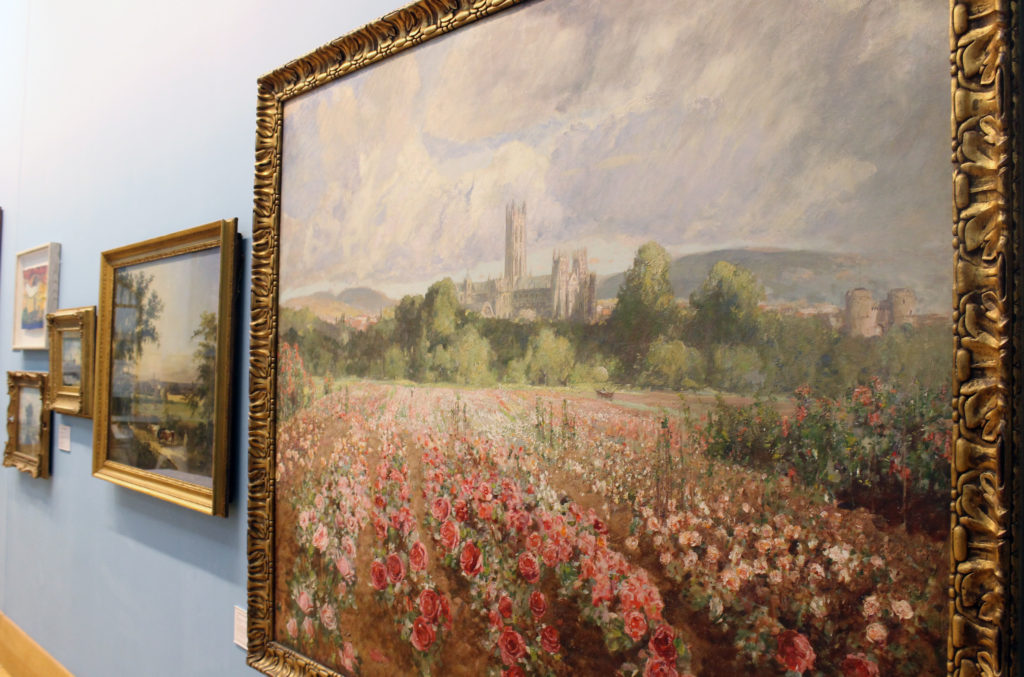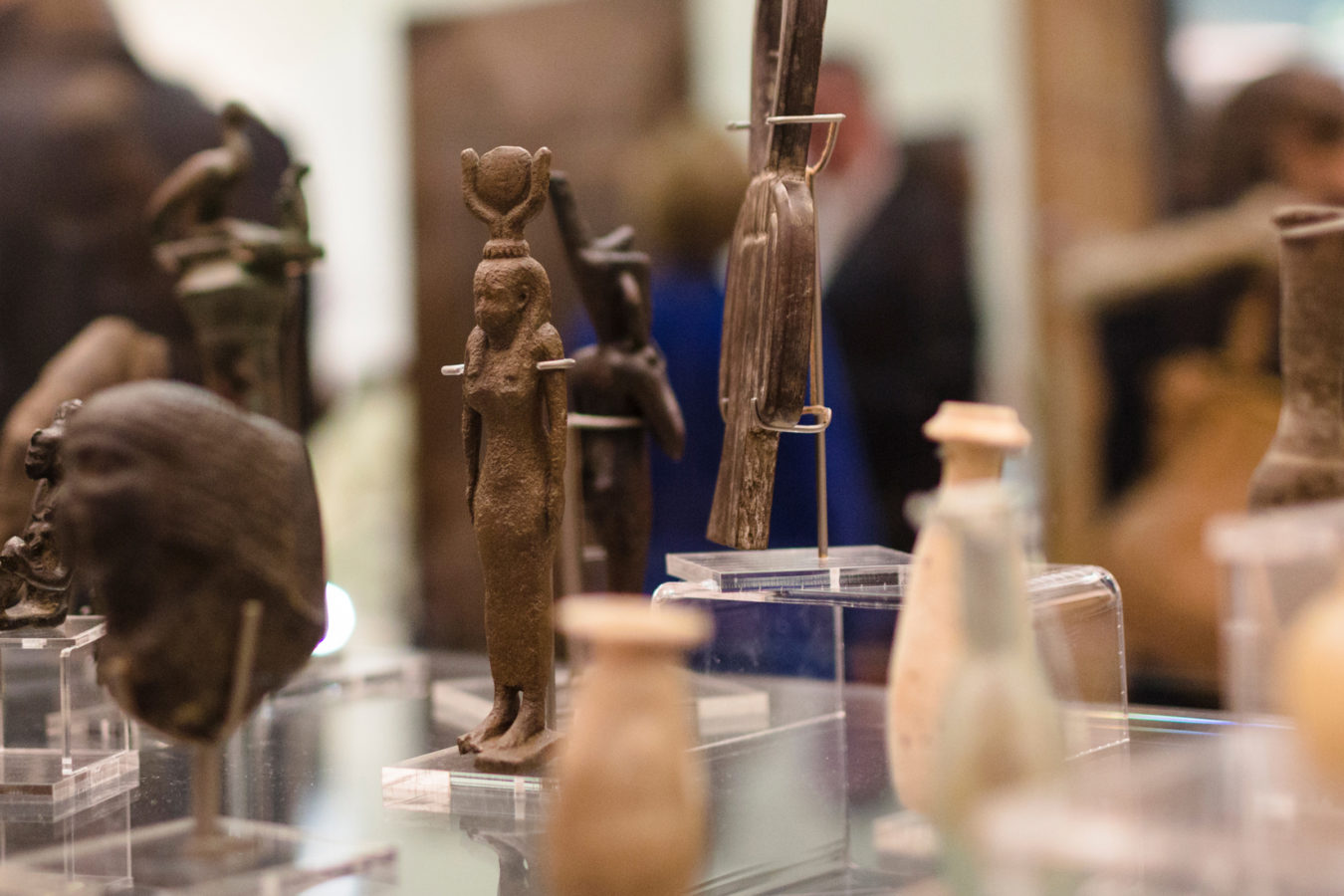
Easter fun at the museums!
Exhibitions, trails and activities; six fun things for all the family to enjoy at The Beaney and...
The large-scale tapestries were created alongside the BAFTA award-winning Channel 4 series, All in the Best Possible Taste, which follows Perry as he embarks ‘on a safari amongst the taste tribes of Britain’ to gain inspiration for his work. Perry said:
“Of all the pieces I have made this was the one I conceived from the outset as a public artwork. I hope that wherever it goes it not only delights the eyes but also sparks debate about class, taste and British Society”

[heading size=”h6″ extra=””]Source: Telegraph[/heading]
Inspired by the 18th century painter William Hogarth’s moral tale, A Rake’s Progress, Perry’s tapestries follow the rise and fall of a fictional anti-hero called Tim Rakewell, as he makes his way up the echelons of British society only to meet his tragic end in a bloody car accident.

[heading size=”h6″ extra=””]Lamentation’. Tim lies dead after a car accident. This scene echoes the final painting of Hogarth’s ‘A Rakes Progress’ where Tom Rakewell dies half naked in the madhouse. [Source: Arts Council Collection][/heading]
Grayson Perry has always been fascinated by taste: why people buy the things they do, wear the things they wear and what they’re trying to say about themselves when they make those choices. He also explores how closely our definition of taste is bound with our perception of class. In the exhibition companion Grayson writes
“The British care about taste because it is inextricably woven into our system of social class. I think that – more than any other factor, more than age, race, religion or sexuality – one’s social class determines one’s taste.”
[fullscreenvideo videourl=”https://www.youtube.com/watch?v=U-smRMFgmOE” autoplay=”0″ fullwidth=”yes”]
[heading size=”h6″ extra=””]UK Trailer for the Channel 4 series, All In The Best Possible Taster With Grayson Perry[/heading]
Whilst filming the Channel 4 series Perry travelled around Britain to the places, events and social rituals which would reveal the reasons why we make – both consciously and unconsciously – emotional investments in the things we choose to live with, wear, eat, read or drive.
As someone originally from a working class background, but now living in middle class Islington, Perry is fascinated by social mobility and the rise of a new middle class. “This is the class that are most aware of the meaning and status of the things that they buy… they’re (the) most self-conscious …” says Perry.
He begins his journey in Kent’s Kings Hill, a new development of executive housing between Maidstone and Tonbridge. He finds a world of aspirational, brand-led taste, with people keen to define themselves from the working-class tastes they have left behind, but uncertain what new taste signals to send out.
Reflecting on his visit Perry explains
“When we were filming the series, one of the encounters that most haunted me was with Jayne Newman, who lived on a new housing development… I wanted to talk to her because she had bought one of the show flats, fully furnished and decorated by the developer. When she moved in, it even had a bathrobe that the interior decorator had chosen hanging on the back of the bathroom door. She had decided to give up a right seen as sacred by the most middle-class people, the right to express one’s individuality through one’s home. The few items she had added to the flat fitted in seamlessly. She said she had bought it because there was so much choice out there and she had a fear of getting it wrong. The show flat had been kitted out in an okay style: neutral tones, unfussy sofas, bland knick-knacks. On her own she might have made a hash of it – she might have, God forbid… bad taste! This was a revelation to me. I had spent a lifetime enjoying control over my aesthetic choices, revelling in it; here was someone admitting to a wholesale avoidance of such decisions.”
Perry believes middle class Britons to be those most acutely self-conscious about what their taste decisions say about themselves. One of the tapestries inspired by Grayson’s visit to Kent, The Annunciation of the Virgin Deal, includes all the everyday essentials – from the cafetière and organic vegetables on the table to the Le Creuset sitting on the Aga – which have been amassed to align the household to a particular “taste tribe”. Grayson finds that, for all the differences between the many middle class “taste tribes” he meets, there is a common emotional undercurrent: a burning desire to show what good people they are. For the middle classes in particular, taste is a deeply moral issue.

[heading size=”h6″ extra=””]‘The Annunciation of the Virgin Deal’. Tim (with baby) and his wife in their nice middle class home. Tim’s business partner (in the foreground) announces that he is now a very rich man having just sold their software business to Richard Branson. [Source: Arts Council Collection][/heading]
Class on the other hand is something bred into us like religious faith. Politicians may talk of a classless society, but Perry believes it still thrives. It is certainly true that people from varying backgrounds may now identify themselves as middle class, but they are still likely separated by a gulf of taste; as a personal example Perry writes
“A childhood spent marinating in the material culture of one’s class means taste is soaked right through you. Cut me and, beneath the thick crust of Islington, it still says ‘Essex’ all the way through”.
Visitors to the exhibition are likely to see themselves in any one of the tapestries and cringe. However, there is a sense of fun threaded into each piece. As Caroline Douglas, Head of Arts Council Collection writes,
“Perry conceived this artwork to surreptitiously poke we Brits in the ribs, and remind us of our endearing pretensions, our prideful weaknesses and, most essentially, our ability to laugh at ourselves.”
So whatever your perception of your own personal class and taste, I think we can all agree the ability to laugh at oneself is a unifying characteristic of being unequivocally British.
Grayson Perry: The Vanity of Small Differences
Continues to Sunday 4 December
Special Exhibitions Room, The Beaney House of Art and Knowledge
18 High Street, Canterbury
